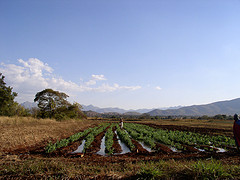Motivation
The first decade of the twenty-first century has seen two food price crises that adversely affected poor people across the globe. During the next 40 years, as the world population approaches 9 billion and incomes in many developing countries continue to rise, agricultural production will struggle to meet increasing food demand. Climate change will put even more pressure on agricultural productivity by making it more difficult for smallholder farmers to manage risk. IFPRI estimates that by 2050, if climate change continues on its current course, rice production will decline by 19 percent and wheat production by 34 percent.
Poor people will be hit hardest by the adverse effects of a warming world. For this reason, IFPRI maintains a strong research program focused on finding ways to help the most vulnerable groups deal with the consequences of climate change. Specifically, IFPRI researchers are assessing the precise impact of climate change on the poor, the role that agriculture plays in emitting greenhouse gases and how to curtail these emissions, and how small farmers can adapt to other impending changes.
Outcomes
In 2009, IFPRI researchers and collaborators, funded by the Asian Development Bank, the World Bank, published Climate Change: Impact on Agriculture and Costs of Adaptation, a food policy report that assessed how the interaction of climate change and agriculture affects hunger, undernutrition, and people living in poverty. Evidence presented in the report demonstrated that offsetting the negative effects of climate change on human well-being will require at least US$7 billion per year in additional funding. Using research results published in this and other reports, IFPRI and its partners collaborated with key organizations, such as the Food and Agriculture Organization of the United Nations, the Global Forum on Agricultural Research, and the International Federation of Agricultural Producers, to put agriculture on the agenda for the 2009 United Nations Climate Change Conference in Copenhagen. The results influenced the conference, as well as follow-up activities.
- In Australia, the IFPRI research monograph Food Security, Farming, and Climate Change to 2050 helped inform Transforming Rural Land Use (Update Paper of the Garnaut Climate Change Review, 2011), which discussed the implications of climate change for food security.
- When explaining the costs of protecting agriculture from the effects of climate change, a number of publications cited IFPRI’s 2009 food policy report, including a quarterly report by Malaysia’s Department of Energy; a newsletter by South Africa’s Department of Agriculture, Forestry and Fisheries; the 2009 Environment and Natural Resource Management Policy for the International Fund for Agricultural Development; the proposal for the CGIAR Research Program on Climate Change, Agriculture and Food Security; and an article in the Economist.



